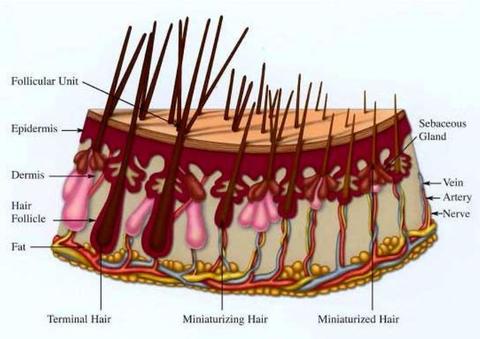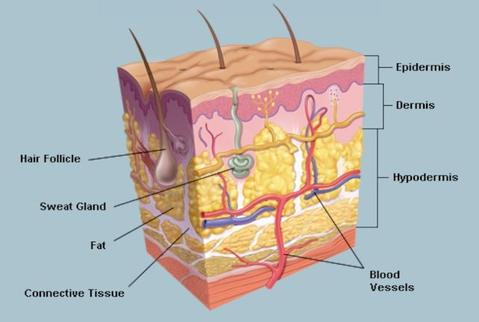Hair, skin, and nails go together like Moe, Larry, and Curly. Seriously, they’re never apart! Hopefully, only your hair (and not your toenails) is Curly.
My goal with this article is to teach the basics of hair, skin, and nail care, discuss nutritional options to support this trio the best, and finally, talk about supplements that can actually have some good results when used properly.
My secondary goal is to change the order of hair, skin, and nails every time I say it because I have a problem with authority and conforming to social norms.
Why Hair, Skin and Nails?
I have an official ranking in the supplement military as Captain Obvious, so, first I must ask – why are hair, skin, and nails always discussed as a triplet?
There are a few reasons:
- Nails, hair, and skin are made from similar building blocks.
- They’re all connected! Hair follicles are in the upper layers of skin. The nail cuticle is found surrounded by specialized skin tissue.
- The cells are rapidly dividing, meaning they grow (and turnover) quickly
- Because they are the quick-changing cells, they can be a window to your health. If you are not eating well or suffering from certain health conditions, that is often reflected in your skin, hair, and nails.
- This has evolved to be a social signal; healthy nails, hair, and skin is a sign of a healthy, disease-free (potential) mate.
- As such, they’ve become a secondary sex characteristic. We love beautiful skin, nails, and hair!
I don’t want you to feel bad about yourself if your toenails are looking rough. If I can convince / fool a wonderful woman to be my partner, you too can find a mate! Seriously though, hair, skin, and nail health is VERY manageable.
Unfortunately, multiple industries exist within the umbrella of the beauty industry to sell you stuff you don’t need and can actually make healthy skin, hair, and nails worse.
A Disclaimer About Nails, Hair, and Skin
For this discussion, we’re going to make an assumption. We assume that the reason for one’s unhealthy skin, nails, and hair is NOT related to a specific disease or condition. Nail fungus, thyroid disorders, acne or other skin disorders, or abnormal hair loss WON’T be discussed. Each of these can and should be addressed individually. It’s crucial to manage these diseases FIRST, as taking biotin for acne is like putting a Band-Aid on a bullet hole.
It should be noted that many of the nutritional and lifestyle changes we recommend will carry over into the recommendations for many skin, nail, and hair conditions.
Nutritional Tips for Hair, Skin, and Nails Health
There are some basic food choices we can make to keep hair, skin, and nails healthy and strong:
- Hydration. This means avoiding caffeine and alcohol, or at least making up for their dehydrating effects by drinking additional fluids. The specifics will be discussed in the Skin Health section.
- Avoid inflammatory foods.
- Fake butter or margarine
- Vegetable oils
- Processed, simple sugars and flour
- Artificial sweeteners
- Eat anti-inflammatory foods
- Healthy fats like avocado, coconut oil, olive oil, real butter, and eggs
- Eat your greens (it’s worth repeating), fruits and other veggies
- Many of these foods are also rich in sulfur, which is a vital nutrient for hair, skin and nail health.
Before we get into supplements for skin, hair, and nail health I want to address the Intraweb misinformation triangle. Many blogs will point to the importance of Vitamin A, C, or E supplementation or mega-dosing on “antioxidant” supplements. The truth is that foods rich in these things will have a profound impact on your hair, skin, and nail health, but supplements of these things on top of a poor diet will not gain you any ground.
My list of nutritional recommendations here shouldn’t be a “Yeah, Neal, OK I’ve heard it before.” Because of the rapid turnover of hair, skin, and nail cells and the role healthy fats and micronutrients play in their development, small dietary changes will have a profound impact.
Let’s talk about proper care for each individually next.
Proper Hair Care
Hair’s a pretty crazy part of our body. Mine is starting to disappear up top but grow on my back. What’s up with that?
Hair’s a pretty crazy part of our body. Mine is starting to disappear up top but grow on my back. What’s up with that?
Here’s what a hair follicle looks like up close, if you haven’t seen it:

Hair grows about ½ inch each month, or about 6 inches a year. Each follicle grows for 1000 days, takes about 3 months off, then sheds the hair and starts the cycle over.
Did you know our hair has an official classification system? The Andre Walker Hair Typing System is an interesting read. I am a type 2c, in case you were wondering. The Walker family has many great accomplishments beyond hair, including the southern policeman, Walker Texas Ranger, the successful family drunk, Johnny Walker, and of course dyn-o-mite 70s comedian Jimmie “JJ” Walker.
This is the part where I teach people who have been showering for decades how to properly use shampoo and conditioner.
Most of us think shampoo is for our hair, but in fact, it is mostly for our scalp. A proper shampoo will cleanse the scalp of oil and dirt while your conditioner will add moisture to your hair. Therefore, choose your shampoo based on your scalp condition. Is it oily? Is it dry and flaking?
There are so many terms around shampoos that are confusing. Strengthening, volumizing, and balancing shampoos are lower moisture than others, so use those if you have an oily, over-moisturized scalp. “Smoothing” or “hydrating” shampoos are ones that add more moisture and are perfect for those of us with dry scalp.
Apply shampoo with your scalp in mind. Massage the scalp, not end-to-end on your hair. Yes, I’m telling you to ignore your hair when using shampoo.
Conditioner shouldn’t be applied to the scalp, because its job is to moisturize and care for your hair. You may have just worked really hard to de-moisturize that scalp, so you don’t want to put more moisture back! Conditioner should start midway up the hair and go to the ends.
For oily hair, stay away from moisture-rich formulations like moisturizing or hydrating. Instead find ones that say strengthening or balancing. For dry hair, look for the opposite.
It took some actual effort for me today to implement these changes myself. I want to hear all about how hard you had to work to break decades of habits!
Proper Skin Care
Here’s the skin close up:

This kinda looks like a layer cake to me. But I’m addicted to sugar.
The biggest takeaway from the image is that the outer layer of skin – the part we often think of as being our skin – is just a small component of a much bigger, complex tissue system.
Skincare comes down to one concept: proper moisturization. We start with moisturizing from the inside out, which is the easiest to do and has the greatest outcomes.
If you’ll notice in our skin picture, there’s a gap between the blood vessels and the very edge of the skin (the part that gets dry). Fluid exchange is happening below the outside of the skin and the oil glands are helping regulate the moisture levels at the surface.
Ensuring we are well hydrated is the key to healthy skin. We talked about fluids here, but the general synopsis for those who aren’t on fluid restriction is:
- Drink half your body weight in ounces + 8-10 oz additional for EACH SERVING of caffeine or alcohol + any losses during intense physical activity
- The smallest amount any of us should drink is about 64 oz.
Moisturization of the skin from the outside is fraught with misinformation. If we overdo it (as many cosmetic companies tell you that you should), we run the risk of our own natural moisturization system taking a vacation. These glands become weak with little use; the glands put their feet up and relax because the skin is moist enough, by their measurement. Getting them back on the job is difficult and there may be a delay, so many people will resort to more moisturizers to ease the dry skin feeling, creating a vicious cycle of addiction to moisturizers (in conjunction with my sugar addiction).
The best moisturizer, by far, is Weleda’s Skin Food. We’ve said that it’s made with Black Magic because the results are incredible. For dry, chapped hands, use it four times a day for a few days then back off to 2 times through the winter. Small amounts are needed yet the results are AMAZING.
Another important point to mention – the skin of your face is VERY different from the skin on your body. The best face care involves the following:
- Low moisture, chemical free products. Too much moisture and your natural systems shut down.
- No moisturization at night, as this is when your body’s moisture system goes to work.
- No scrubbing – your face is not the floor or your dishes.
- No harsh chemicals like alpha hydroxy acids – this will tear away the outermost protective layer of the skin. While you may get some short term gains, in the long run your skin weakens.
An interesting bit about oily facial skin: we can use oil to reduce the oil. Weird, right? So your body has many feedback systems. Not enough thyroid detected? Make more! Low blood sugar found? Let’s bump those numbers up! Too much oil on the skin? Let’s turn off the oil pumps. Using a small amount of proper facial oil (i.e. a few drops only) can shut down overactive oil glands and help people with oily skin. It sounds crazy to add oil to your skin but remember, creams are a combination of oil and water. We’re always balancing those two things anyway.
The best facial care regimen is:
- Morning
- Cleanser – a special, gentle soap for the face
- Toner – modern toners aren’t drying astringents as they used to be, but helpful tools to further cleanse and strengthen the skin after washing.
- Moisturizer – gentle, chemical free moisturizers are essential for regular skin health.
- Evening
- Cleanser
- Toner
Why do we skip a moisturizer at night? Were you not paying attention? It’s ok… Our natural moisture processes boot up while we sleep. Putting on night creams is actually detrimental as it causes that system to weaken. You then become dependent upon the creams or suffer from the feeling of dry skin.
We generally recommend Dr. Hauschka’s products as they are among the highest quality products on the market. We don’t sell them online, but we have them in our store (at a 25% discount!), so give us a call and we can advise you on the best options.
General Tips For Skin Care
- Take warm, not hot showers. Limit your time to 5-10 minutes.
- After bathing, showering, face washing – whatever – blot your skin to dry it – don’t rub. Especially if you forgot the fabric softener.
- Chill on the makeup. Choosing poor quality makeup or using too much of it can clog pores.
- Choose gentle, fragrance free cleansers, deodorants, and moisturizers.
- Moisturize!
- Moisturize internally by drinking lots as we’ve said many times before.
- Moisturize your skin by using creams or ointments, not lotions.
- Don’t moisturize your face at night.
- Life is balance. Don’t slather on moisturization to healthy skin like you are spackling a wall.
- Moisturize the environment. Use a humidifier, especially if you have fireplace, a dry house, or a dry sense of humor.
- Scrubbing is for dishes and the floor, not your face.
Nail Care
Do you aspire to have healthy nails like this fella?

I’m passing out fun facts like “I Voted” stickers on election day, so here’s another: Your nail growth rate is based on the length of your outermost finger bones. This means your index will grow faster than the pinky, and your toes will grow slower than your toenails.
To regrow nails, it takes about 3-6 months for the fingers and 12-18 months for the toes. As an aside, this is what makes treating nail fungus so difficult – you have to stay on it every day for months on end or you run the risk of re-contaminating the nail.
Nails aren’t the impenetrable shield that we think they are. In fact, your nails are more permeable than the skin! This is why cosmetics like nail polish can be dangerous.
Otherwise, nail care comes down to clipping and filing down your nails regularly. With proper tools, not your teeth. Clean underneath the ends of your nails to get out the gunk that gets stuck there regularly.
Unhealthy nails are directly tied to many different micronutrient deficiencies. A lack of Vitamin A, D, calcium, or iron can cause pale, brittle, thin, and dry nails. B12 deficiencies cause dry and dark nails. A lack of good fats, especially Omega-3s can cause splitting and flaking of nails.
Supplements for Healthy Hair, Skin, and Nails
A preface: because we are Americans living in Social Media land, we expect quick results. With hair, skin, and nail health, we have to be patient. We should expect changes in no sooner than a month. If we start a product and within 2 weeks we feel our hair (which hasn’t grown more than a quarter-inch) looks remarkably different, we may not be being honest with ourselves.
A realistic expectation of proper nutrition’s impact on hair, skin and nails would be 2-3 months after we start.
Vital 5 Supplements
The Vital 5 are what I consider the 5 most important nutrients that we should supplement. They are fish oil, probiotics, calcium (bone health), protein, and whole food vitamins. They are chosen for 2 reasons: First, even with the best diets, most of us aren’t getting enough of them. Secondly, there is ample evidence that shows if we DO increase the amount of these nutrients, long-term benefits can be realized across many body systems.
Almost all of the Vital 5 supplements will have some positive impact on skin, hair, and nail health. Probiotics are the only ones with a “meh” level benefit. A healthy gut means healthy digestion, but that’s reaching.
Fish Oil
Omega-3 essential fatty acids regulate oil production and boost hydration while playing a role in the structure and appearance of the skin.
There is evidence of Omega-3’s positively helping people with sun-damaged skin or helping reduce eczema by 20%.
The Omega-3 fatty acid EPA produces a family of hormones called prostaglandins, which stop your body from producing too much sebum in the hair follicles, helping to unclog pores. By consuming enough Omega-3, you can reduce skin inflammation from the inside.
We recommend 3000mg of EPA and DHA daily to restore a skewed Omega-6 to Omega-3 ratio. High Potency Fish Oil CollectionNeal’s Pick: Ultra Pure Omega
Protein
Protein is the core building block of all hair, skin, and nails. Protein is used to make 2 main structural components of hair, skin, and nails: keratin and collagen.
These two components are VERY similar with slight differences. They are both linear, fibrous, and strong. They both form helices and create strong fibers by closely packing together. The main difference is where they are found.
Keratin is found on epithelial cells (the cells lining our mucous membranes, for example) and on our appendages – like hair. Collagen is found as structural support all around the innards of our body, giving muscles, bones, blood vessels, etc shape and strength.
If you aren’t reaching your daily goal of protein (approximately 1 gram of protein for every kg of body weight), supplementation might be wise. We’ve discussed protein supplements before.
You don’t need (or want, really) a keratin supplement. It can’t be digested… If you provide ample protein, you’ll make keratin.
You can, however, use collagen as an additional protein source if you are already getting many complete proteins and just need to level off. We discussed their benefits here.
Neal’s Pick: Vegan/Vegetarian Protein: Complete Plant Protein Omnivores: Collagen Peptides or Myocep
Calcium
We’ve discussed calcium at length. Is that a hair joke?
Calcium is an essential mineral used in numerous body systems. It is necessary to help create structural components like hair, skin, and nails. In calcium deficient states, one could expect fragile and thin skin, hair loss, and brittle nails.
Most of us don’t get enough calcium. Those of us who are supplementing are often supplementing with too much of the wrong kinds.
Shameless Plug: Our Calcium Care has whole food sources of calcium, collagen, Vitamin C, and silica – all beneficial to nail health!
Neal’s Pick: Calcium Care or for Vegan/Vegetarians: Vegan Calcium/Mag Powder
Whole Food Vitamins
As we said before, as long as you have a healthy diet, increasing the amount of Vitamin A, E, C and all that other stuff via supplements won’t really have a profound positive impact on hair, skin, and nails.
For those of us who don’t, it’s important we use a whole food vitamin to supplement those micronutrients naturally. Many of us don’t get enough greens, reds, and blues, so we recommend whole food supplements rich in those ingredients.
Neal’s Pick: SuperGreens and Vital Greens and Reds
Other Supplements for Hair, Skin, Nail Health
Biotin
Biotin is a B-Vitamin often promoted for its benefit to nail, hair, and skin health. It is Vitamin B7 and was originally called Vitamin H for the German Haar and Haut which mean “hair and skin.” It has some role in the structural components of hair, nails, and skin. Some believe it stabilizes or helps build keratin complexes.
Biotin doses found in multivitamins or B-Complex supplements are low – normally around 400mcg. The recommended dose based on the small studies around Biotin and hair is 5000mcg. That is the same as 5mg, in case you see that written somewhere.
Does it work? Maybe. The data is weak, but anecdotes are high. We know if we had a biotin-deficient person, hair loss would be guaranteed. True biotin deficiency is rare.
Silica
A supplement for hair, skin, and nails that people often overlook is silica, also known as orthosilicic acid. Silica-rich foods are bamboo and horsetail, which many of us don’t eat much of.
Silica is rich in connective tissues and is found in bones, tendons, the kidneys, and the skin. Much like biotin, a true deficiency is rare, but if it does happen, weak, thinning hair and brittle nails will result.
Neal’s Recommendations for Hair, Skin, and Nail Health Supplements
Here we go!
- Omega-3
- Ultra Pure Omega or Alaskan Omega 900
- Delivers 3000mg of EPA and DHA easily and cost-effectively!
- Calcium
- Calcium Care or Vegan Calcium
- Contains calcium, collagen, and silica!
- Protein
- Myocep, or Complete Plant Protein
- Collagen Peptides for a dense protein that is healthy for hair, skin, and nails
- Whole Food Vitamins
- Supergreens or Vital Greens & Reds
- Only if you aren’t getting enough
- Biotin and Silica
- Regenerate Plus – rich in biotin and choline-stabilized silica
- Biotin by itself at 5000mcg
Keeping Hair, Skin, and Nails Health Simple
Let’s say your evil godmother locked you in a tall tower. While you wouldn’t want your strong nails and skin to help someone climb up to rescue you, a strong bit of hair will do you well.
Otherwise, healthy and strong hair, skin, and nails is a great indicator for your overall health. It means you are doing things right. Having healthy hair, skin, and nails is about keeping it simple:
Hair Skin and Nail Health can be accomplished in 4 steps:
- Eat well
- Treat your hair, skin, and nails right with good, healthy habits.
- Manage any diseases that could be causing your hair, skin, or nails to be unhealthy
- Supplement key nutrients when appropriate
This is an important message we will end on. Many people (women especially) will have more than 4 products for beauty care, with the average being more than you can count on one hand. Facial care, hair care, makeup, and now supplements?!
It doesn’t have to be so complicated. These industries’ sole purpose is to get you to buy more stuff. Instead, look for smarter buys – higher quality products in a simplistic regimen.
If you want to improve your hair, skin, and nail health, start from the inside and work your way out. Simplify your diet by using healthy, real foods. Stay hydrated. Practice habits that treat your hair, skin, and nails well. If you want to use supplements, start with the Vital 5, as these nutrients have an impact well beyond just cosmetics. After a month or two, give one of the other supplements a go. Measure their effect after a reasonable amount of time, usually 2-3 months.
With this strategy, you can have awesome nails that look like this:

Just trying to keep it real…

Neal Smoller, PharmD
Owner, Pharmacist, Big Mouth



